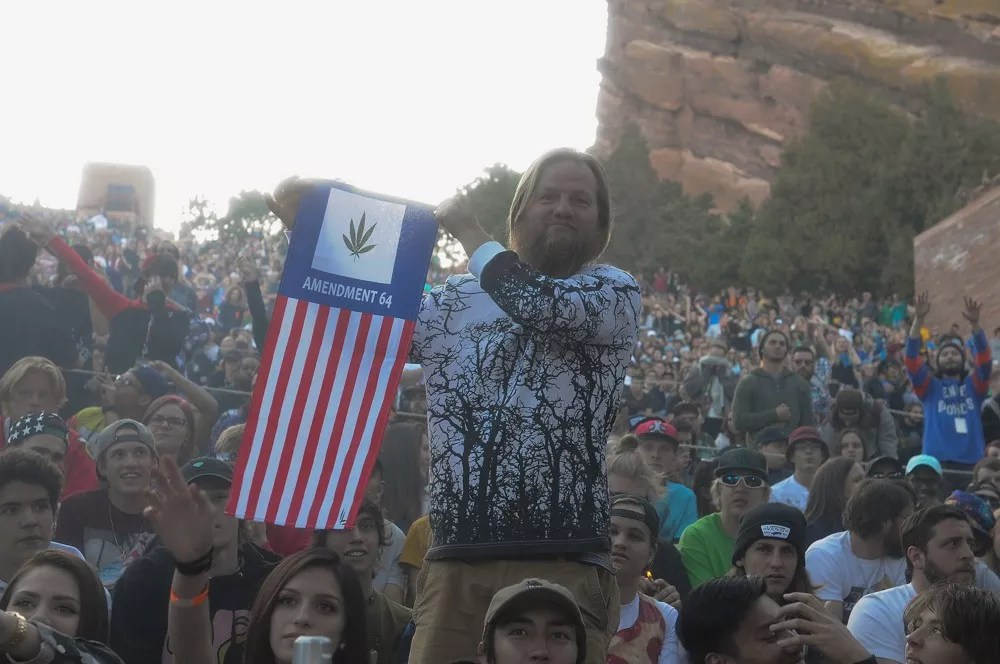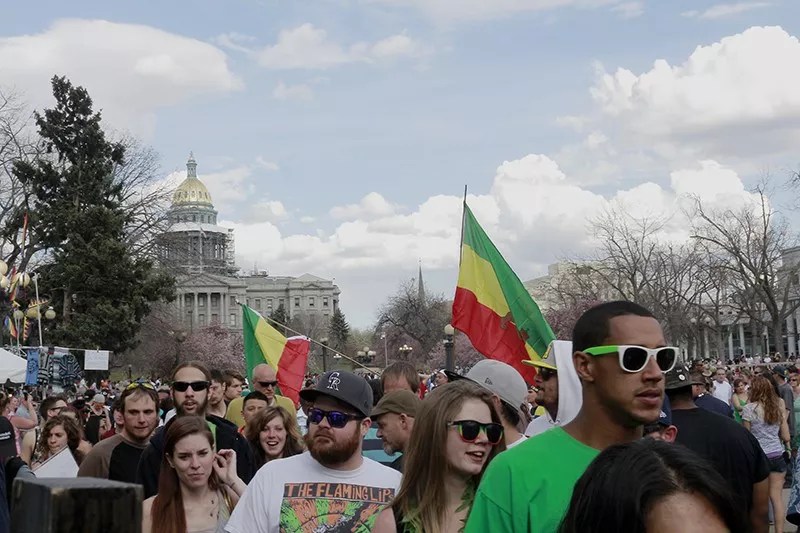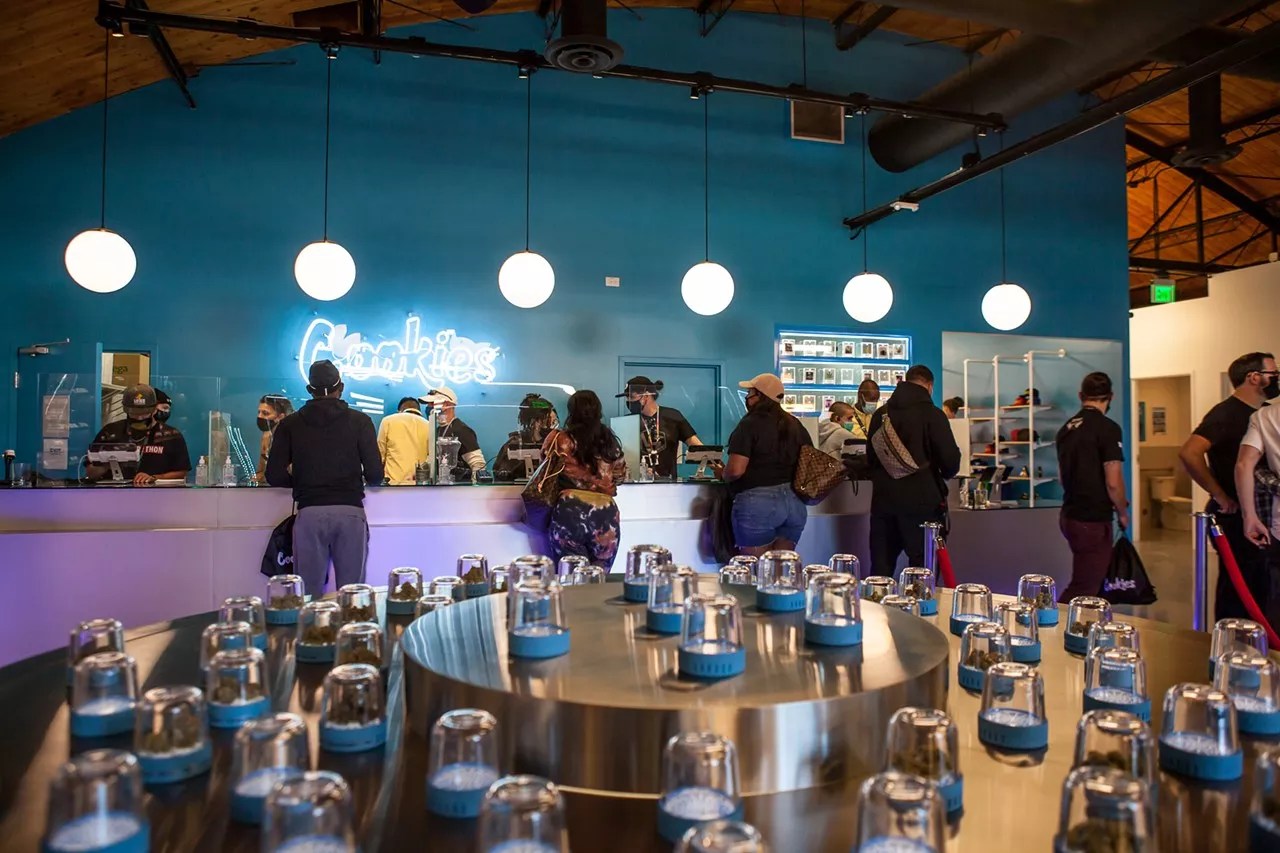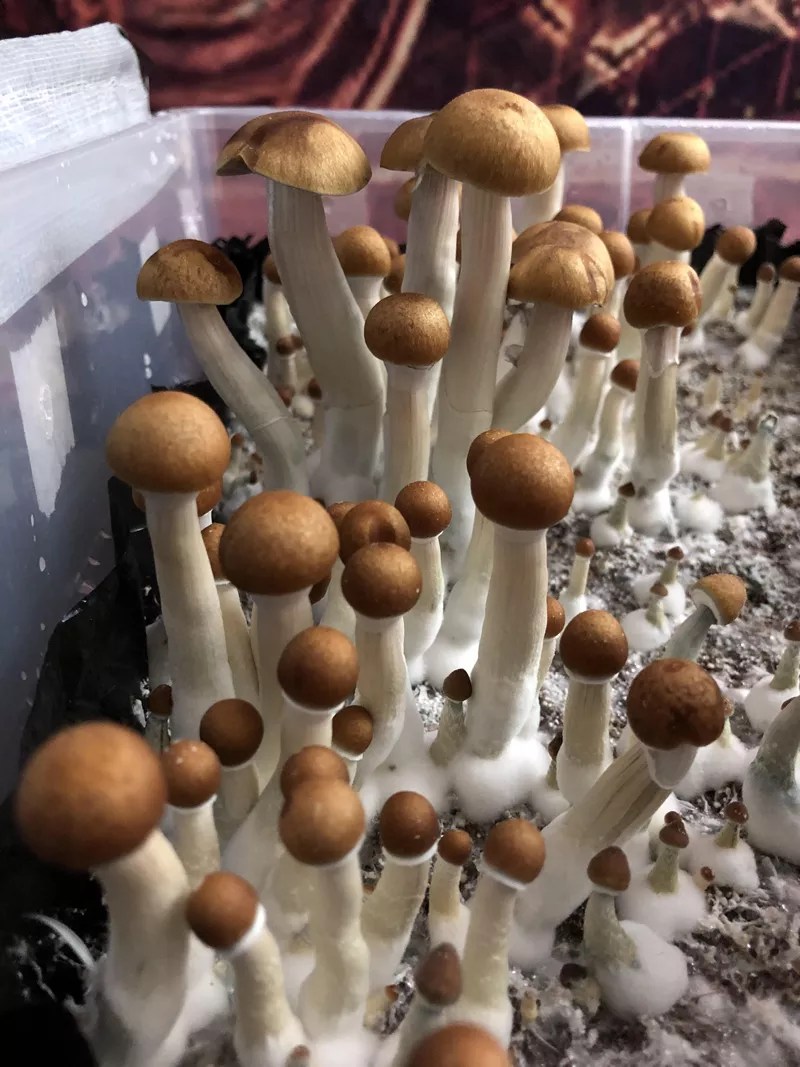
Miles Chrisinger

Audio By Carbonatix
Has it been almost ten years? The sky hasn’t fallen, and Taco Bell hasn’t yet won the fast-food wars.
November 6, 2022, will mark a decade since Colorado voters officially legalized recreational pot sales, yet our state’s relationship with cannabis has grown in dog years, going from a Wild West of unregulated weed sales in 2013 to clearing $2.2 billion in taxable revenue in 2021. Colorado’s connection to cannabis extends much further back than a decade, however, and the state’s role in plant-based medicine reaches far beyond cannabis.
As we head into the second decade of legalization, we’re recalling lessons for how we could move forward. Here are ten stories that define Colorado’s connection to cannabis:
Colorado’s Real First in Marijuana
Over 85 years before Colorado legalized cannabis, the state was home to the country’s first arrests under the Marihuana Tax Act of 1937.
Considered the country’s first legislative act against cannabis, the Marihuana Tax Act placed a tax on the sale of cannabis and forced suppliers to register and record their sales. The $1 tax stamp applied to buyers and sellers for each transaction, but aimed to cut out recreational use.
“In principle, the Marihuana Tax Act of 1937 stopped only the use of the plant as a recreational drug. In practice, though, industrial hemp was caught up in anti-dope legislation, making hemp importation and commercial production in this country less economical. Scientific research and medical testing of marijuana also virtually disappeared,” reads an account from the United States Department of Homeland Security.
The Marihuana Tax Act still allowed some medical marijuana sales within the country, and was largely promoted as an effort to crack down on street dealers and addictive drug use. But the measure was opposed by the American Medical Association, which felt the tax would suppress medical marijuana. Even so, Congress passed the bill on October 1, 1937, and Denver’s place in cannabis history was cemented soon after.
Police arrested Moses Baca and Samuel Caldwell on October 5 for violating the new federal law, according to a Denver Post article, with Caldwell allegedly selling Baca a whopping two joints on a Tuesday night. Caldwell was sentenced to four years and Baca to eighteen months at Leavenworth Prison. “Marijuana destroys life. I have no sympathy for those who sell this weed,” U.S. District Judge J. Foster Symes reportedly said at the time of their sentencing.
Although the federal arrests under the act took place in Colorado, the state legislature had outlawed cannabis two decades earlier. In 1917, Colorado lawmakers made the use and cultivation of cannabis a misdemeanor, upgrading it to a felony in 1929.
Medical Marijuana
While Colorado voters approved medical marijuana with the passage of Amendment 20 in 2000, the state had made several moves in that direction in the 1970s. At the beginning of a short-lived rise in the plant’s acceptance, Colorado lawmakers downgraded recreational cannabis possession from a felony to a misdemeanor in 1970. A 1972 report from the National Commission on Marihuana and Drug Abuse recommended that penalties for possession and adult use be terminated altogether, and Republican state representative Michael Strang even tried to legalize it outright in Colorado a year later. Strang’s effort failed, but cannabis was beginning to find more sympathizers in the state, and Colorado eventually decriminalized the possession, transportation and private use of marijuana in 1975.
Medical research pointing toward the plant’s effectiveness in treating certain illnesses began surfacing in the 1970s, as well, and the country’s support for medical marijuana and cannabis decriminalization rose nearly 15 percent in the middle of the decade. Colorado passed bills in 1979 and 1981 that allowed certain medical patients to be prescribed marijuana, but both were dependent on federal approval. Public support for cannabis began dropping again in the early ’80s, however, and the opposition stayed firm for about fifteen years. Then California voters approved the use, cultivation and sale of medical marijuana in 1996.
Eight states had followed suit by 2000, including Colorado. It wasn’t an easy ride, though. A push to legalize medical marijuana in 1998 was squashed by then-Secretary of State Vikki Buckley, who said the measure didn’t have enough signatures to get on the ballot in the first place, and refused to count the votes that election. Proponents were successful two years later, however, with Amendment 20 receiving 54 percent of the vote.
In 2001, Congress passed legislation barring the U.S. Department of Justice from using federal funds to interfere with state-legal medical marijuana programs, giving more breathing room to patients and their caregivers. The caregiver model and looser federal enforcement enabled designated cannabis growers to cultivate plants for registered patients who were unable to grow their own. This created a home-growing landscape across Colorado that planted the seeds for stores that would serve as caretakers for multiple patients, “dispensing” their medicine.
In 2009, U.S. Deputy Attorney General David Ogden issued a legal memorandum for U.S. attorneys regarding how to approach states with legal cannabis, suggesting that they take a hands-off approach toward complying businesses. Shortly after the release of the Ogden Memo, medical marijuana dispensaries began popping up all over metro Denver, partnering with patients who registered the dispensaries as their official caregivers. This created the early dispensary scene in Colorado, which eventually turned into the vast cannabis market we have today.

The University of Colorado Boulder’s days as a 4/20 destination were short lived, but glorious for the cannabis crowd, seen here in 2010.
Flickr/Zach Dischner
College Days
Colorado’s connection to pot wouldn’t be where it is now if institutions of higher learning had never gotten involved. In 1965, a Rocky Mountain News article relayed the shock of realizing how many students at the University of Colorado Boulder were using cannabis, and how easy it was to find on campus. A few years later, the News reported that 67 percent of students at Colorado College favored cannabis legalization. And sometime around 2000, 35 years after the News shared its dismay with the amount of pot on the CU campus, the school briefly became the state’s cultural center for cannabis.
That’s when CU students began holding public smokeouts at Farrand Field on April 20, the unofficial cannabis holiday known as 4/20. In 2003, there were nearly 1,000 people on the field, and attendance continued to grow despite public discouragement from university officials. In 2005, the school began turning on sprinklers around 4:20 p.m., watering the lawn and protesters. The year after that, photos of 4/20 crowd members were posted online by CU police, with financial rewards offered for identification of students on the field. None of that discouraged the unofficial holiday.
The acts of defiance created enough momentum for Denver-based Safer Alternative for Enjoyable Recreation (SAFER) to introduce and successfully pass measures at CU and Colorado State University that made cannabis-related penalties no worse than penalties for alcohol offenses on campus. In the following years, CU’s 4/20 presence grew larger – and so did the pushback.
In 2007, a barricade was erected around Farrand Field, so students held their 4/20 smokeout at Norlin Quad, where it remained for several years. The size of the event grew to 10,000 people, helping earn CU’s top ranking in Playboy‘s party schools of 2011. To celebrate the award, CU took a harder stance against 4/20, applying smelly fertilizer to the lawn in 2012 and shutting down the area entirely in 2013. The CU 4/20 celebration hasn’t returned since, but its presence – and photos – will always be a part of the state’s journey.
Denver Decriminalization
Building on the success of the resolutions passed at CU and CSU, SAFER set its sights on Colorado’s largest city and cannabis capital: Denver. The effort was much more of a sprint than a marathon, with SAFER able to get a cannabis decriminalization initiative on the local ballot in 2005, the same year the organization was victorious at Colorado’s two largest universities.
The measure, which decriminalized possession of an ounce of pot for anyone 21 and older, was opposed by then-Mayor John Hickenlooper and the Denver Post‘s editorial board, while a Westword article stated that the measure was “mostly symbolic” and “simply reinforced the state’s 1975 decriminalization laws.” However, the symbolism was strong after 54 percent of voters approved the move, with Denver hailed as the first major city to legalize cannabis across the nation. Whether the tangible impact was big or not, Denver’s Mile High reputation was set for years to come.

Attendees celebrate in front of the Colorado State Capitol during the 2014 420 Rally in Civic Center Park.
Kyle Huninghake
Denver’s 4/20 Connection
Big celebrations for 4/20 have been a mainstay in Denver for more than two decades, before the city decriminalized pot or Colorado legalized medical marijuana. Although the 4/20 concept didn’t start in Denver – the origin story dates back to 1971 in Marin County, California, where a group of high school friends used 4:20 as their regular meetup time for after-school weed sessions – the annual gathering at Civic Center Park is now one of the world’s largest, drawing tens of thousands.
Denver’s connection to 4/20 is largely thanks to cannabis activist Ken Gorman, who began hosting monthly “smoke-in” protests at Civic Center Park in 1995 before eventually turning it into a full-fledged rally on April 20. From there, it grew into the pot party it is today.
“At first the city nailed him for not having an event permit, so we went through that bullshit permitting process every month. There were other crazy things he’d do to get in trouble, and various ways we’d try to avoid it. We’d fill bongs with wax so they weren’t technically usable,” Warren Edson, Gorman’s attorney, remembers. “These were the days when they were all ‘water pipes’ and ‘for tobacco use only.’ Eventually, all of this turned into the 4/20 event.”
Gorman was murdered in 2007 (the case remains open and unsolved), but his friends continued the tradition of gathering at the park, hosting what became the 4/20 Rally in Denver at Civic Center Park from 2007 to 2017. The event focused on advocacy and politics in the early years, but slowly turned into more of a festival and celebration as Colorado’s pot industry evolved. The free 4/20 rallies and festivals at Civic Center, though permitted by the Denver Department of Parks and Recreation, have never been licensed for public pot use, and police hand out a hefty number of citations to stoners straggling too far from the herd.
Euflora, a Denver-based dispensary chain, took over the Civic Center event permit for April 20 in 2018 from previous holder and Gorman disciple Miguel Lopez, after Lopez ran into opposition from the city over operating and cleanup issues following the 2017 event. After a two-year hiatus because of the COVID-19 pandemic, the 4/20 celebration at Civic Center, now dubbed the Mile High 420 Festival, returned with a free party, concert and one ridiculously large plume of smoke on April 20, 2022.
Amendment 64
Cannabis advocates tried to legalize possession statewide in the 2006 election, but Initiative 44 barely got 41 percent of the vote. Six years later, however, Amendment 64 passed easily – tying with Washington’s Initiative 502 as the first statewide measure approved by voters to legalize and regulate recreational cannabis. Governor John Hickenlooper made the vote official in December 2012, beating Washington, and making Colorado the first state to officially legalize pot.
There were several legalization initiatives brewing in 2011, but SAFER founder Mason Tvert and cannabis attorney Brian Vicente’s Campaign to Regulate Marijuana Like Alcohol won out in the end. The constitutional amendment, which drew over 55 percent of the vote in 2012, allowed people 21 and older in Colorado to possess up to 1 ounce of cannabis (a law passed in 2021 increased possession to 2 ounces), as well as to grow up to six plants of their own. The law also allowed towns to enact licensing systems for recreational marijuana stores, with tax rates and industry regulation later set up through the state legislature and the new Marijuana Enforcement Division over the next year in anticipation of a January 1, 2014, start date.
Many criticisms leveled at Amendment 64 by cannabis advocates before the vote still exist today, including sales limits on cannabis, strict social consumption laws, a lack of employee protection for off-hour marijuana use and the prohibition of firearm ownership for medical marijuana patients. Amendment 64 was also called out for not having carveouts for social equity entrepreneurs from communities impacted by the War on Drugs, an issue that local and state governments didn’t begin to address until 2020.

Sean Azzariti makes Colorado’s first legal recreational marijuana sale at 3D Cannabis Center on January 1, 2014.
Brandon Marshall
Despite the criticism, Amendment 64’s passage resulted in the first recreational cannabis sales system in the country when adult-use dispensaries opened in Colorado on January 1, 2014. Since then, Colorado dispensaries have sold over $12.5 billion in marijuana products, according to the state Department of Revenue, raising over $2 billion in taxes (not counting local revenue). Hickenlooper, who’d opposed statewide legalization, had warned those celebrating Amendment 64’s victory not to “break out the Cheetos or Goldfish too quickly,” but ultimately reversed his stance after he left that office, even posing with the snacks for a photo. Mayor Michael Hancock, another detractor of legalization during the Amendment 64 campaign, has also publicly changed his stance on legal pot, appearing at a March 2022 ribbon-cutting for a marijuana hospitality lounge in Denver’s RiNo neighborhood.
Industrial hemp was also legalized in Colorado through Amendment 64, though it was viewed as a small side note at the time. Shortly after legalization, however, Colorado quickly became one of the largest industrial hemp producers in the country. With the emerging interest in cannabidiol (CBD), a non-intoxicating compound in marijuana and hemp plants, Colorado briefly led the U.S. in hemp farming acreage. Since the federal legalization of hemp farming in 2018, Colorado’s hold on the hemp market has fallen, but the state is still viewed as an industry leader and ranked third in hemp acreage last year, according to a market report in Hemp Industry Daily.
Colorado still has plenty of opponents of cannabis legalization, but the industry is too big for the state to turn back now.
Charlotte Figi
Charlotte Figi became a catalyst for medical marijuana around the globe in 2013 when she appeared on Dr. Sanjay Gupta’s Weed documentary on CNN. Gupta had doubted medical marijuana’s efficacy until he met Figi, a toddler who suffered from Dravet syndrome, a rare form of epilepsy that can cause extreme seizures. Figi had been treated with CBD oil extracted from a non-intoxicating strain of marijuana, and no longer required a feeding tube to eat; her family reported that CBD had nearly eliminated her seizures. The Stanley Brothers, Colorado growers of the strain of high-CBD marijuana she used, later named the strain and future hemp company Charlotte’s Web after Figi. Other patients moved to Colorado for the same treatment, helping to create the phrase “medical marijuana refugee.”
Colorado had already passed Amendment 64, but the Figi family’s story further solidified the state’s status as an epicenter for cannabis, created a swell in national support for legalization, and opened the door to conversations about medical marijuana that hadn’t existed before.
Unfortunately, Figi was among those at higher risk during the pandemic. In March 2020 she was hospitalized with what her family believed were complications from COVID-19; her mother soon announced that she had passed away at the age of thirteen. Just over two weeks after Figi’s death, Governor Jared Polis issued an executive order proclaiming that April 7 would forever be known as Charlotte Figi Day in Colorado. On the most recent Charlotte Figi Day, the Stanley Brothers announced that ten families would receive a year’s supply of Charlotte’s Web formula as part of a new grant program in her honor, with another family announced each year.

Legal pot’s evolution has led to a thriving industry in Colorado, with many of the state’s current players based elsewhere.
Jacqueline Collins
Changing Business
Colorado’s cannabis industry has grown up since Toni Savage Fox sold Sean Azzariti the country’s first legal recreational bag of pot on January 1, 2014. The dispensary where that sale took place, 3D Cannabis Center in north Denver, is now a Euflora location. A six-store chain with a delivery service that also holds the permit for the Mile High 420 Fest, Euflora is far from the largest cannabis business operation in Colorado, however.
Colorado eased ownership restrictions on the cannabis industry in 2019, allowing more investors and publicly traded companies to own businesses. Since then, acquisitions have taken off, with homegrown enterprises and outside companies alike swallowing up smaller stores, cultivations and product makers. Old stand-alones like Denver Relief, Sacred Seed and Walking Raven started being acquired three years ago, and now some of the chains are getting bought out, too. The Green Solution, LivWell Enlightened Health, Green Dragon and Star Buds, four of the state’s five largest dispensary chains, have all been acquired or have agreed to acquisition offers from varying cannabis corporations over the past two years (Green Dragon’s acquisition by Eaze hasn’t closed yet), while new players from California and other states have entered the fray. Now that sixteen more states have legalized recreational cannabis since Colorado and Washington made the move back in 2012, the industry is becoming more national. Cookies, a dispensary chain and cannabis breeder from California’s Bay Area, is one of Colorado’s most popular pot brands.
“You’ll continue to see Colorado companies engage in this activity, but I think it’s a part of the industry as a whole right now,” said Joe Hodas of Wana Brands, one of Colorado’s largest edibles manufacturers, after Wana agreed to a $300 million acquisition offer from Canopy Growth, one of Canada’s largest cannabis corporations. “In order to grow in this industry, some type of relationship would be necessary. Someone with deeper capital and greater reach.”
Tightening Rules
Much of Colorado’s positive reputation regarding cannabis legalization comes from the extra tax revenue, lower arrests rates and level of youth consumption, which has stayed largely the same since pre-Amendment 64 numbers. However, the cannabis industry has shown that it’s not above reproach, either, and continues to deal with growing pains surrounding pesticide use in production, moldy and contaminated plants, and the treatment of low-level workers. State regulators have addressed several of these issues through surprise inspections, but there are still lawmakers who’d like to see legal cannabis reined in further.
Colorado’s first major bump in the road after recreational pot sales began garnered fast headlines. Stories of edible freakouts suffered by new cannabis eaters popped up frequently in the months following the opening of recreational dispensaries. Reports of accidental ingestion by children and pets, two deaths potentially linked to edibles, and a very public case of over-consumption by New York Times columnist Maureen Dowd shone a light on a real problem: People didn’t know how to eat weed.
One of the final (and most infamous) straws came during the 2014 Denver County Fair, when several attendees said they were given pot-infused chocolate bars by LivWell. The dispensary had sent sample chocolate bars to the fair that were supposed to be free of THC, but at least three people reported feeling intoxicated and nauseous, and eventually tested positive for THC after the fair. All of the public mishaps put pressure on Colorado to educate consumers and regulate THC-infused food and drinks, which eventually resulted in 10-milligram servings and a “Start low, go slow” campaign by the state.
After edibles, home grows came under the lens. Federal and local law enforcement agencies had quickly reported increased black market activity after recreational pot was legalized in Colorado, and anything in the gray was swept out. A 2015 law required medical marijuana caregivers to register with the state and created stricter guidelines for exemptions allowing patients to grow more than six plants. Shortly thereafter, some local governments passed laws restricting recreational marijuana growing on residential properties, and a 2017 law at the state level implemented those property restrictions statewide. Marijuana industry groups largely supported the measures, but medical marijuana patient advocates and early consumer activists condemned the new laws as moves toward a commercial-only landscape.
In 2021, an effort to limit the potency of commercial marijuana products began taking form at the Colorado Capitol. Proposed as an attempt to curb youth use of highly potent extracted marijuana products – a quickly growing problem since recreational dispensaries had opened, according to the state Department of Public Health and Environment – the law added new restrictions to medical marijuana patients and physicians. The law also cut down allowable medical marijuana concentrate purchasing amounts, mandated mental health reviews for prospective patients under the age of 21, and required that all dispensary purchases made by patients be entered into a new state tracking system. Since the new law took effect this past January, medical marijuana sales have seen their lowest numbers since recreational sales began in 2014, according to the Department of Revenue.

An established leader in cannabis regulation, Colorado could lead a similar path for psychedelics.
Anthony Camera
Mushrooms
Denver’s status as a trailblazer for cannabis helped set up another first for the city in alternative medicine and drug-policy reform: psychedelics. In 2019, Denver became the first city in the country to decriminalize consumption, possession and growth of psilocybin mushrooms. Other cities and states followed suit, with Oregon even legalizing psilocybin-assisted therapy.
Colorado could soon help lead the charge for psychedelic medicine legalization. A proposal that would legalize psilocybin, create licensed “healing centers” for therapeutic psychedelic sessions and seal certain prior convictions is on the November 8 ballot. That proposal would open the door for DMT, ibogaine and mescaline legalization by state regulators, as well.
If voters approve Proposition 122 on Tuesday, Colorado could soon have one of the first major mushroom markets in the country – with many of the same challenges that came with the legalization of cannabis almost a decade ago.
This story has been updated from the original published in April 2022.